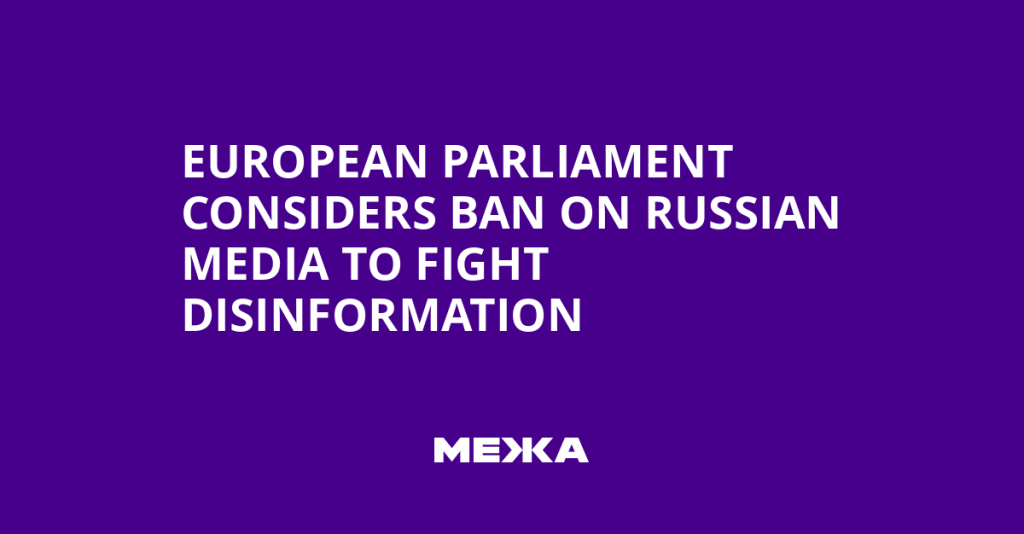Listen to the article
European Parliament Weighs Ban on Russian Media Across Its Networks
The European Parliament is deliberating a potential ban on Russian media across its internal networks and official platforms, citing concerns over disinformation campaigns and information warfare orchestrated by the Russian Federation. This move comes as EU institutions seek to bolster digital security and ensure transparent communication with citizens.
The proposed restrictions would limit access to Russian media outlets on official computers, corporate platforms, and during the Parliament’s public communications. The primary objective is to mitigate the influence of targeted disinformation on Members of the European Parliament (MEPs) and staff who shape EU policies and legislation.
Officials involved in these discussions emphasize the delicate balance between countering propaganda and upholding the fundamental principle of freedom of expression. The Parliament is consulting with various political groups and experts in media literacy and information security to develop a nuanced approach that aligns with EU legal frameworks and international standards on media freedom.
“This isn’t about censorship but protecting the integrity of our democratic processes,” said one Parliament official who requested anonymity due to the sensitive nature of the discussions. “Russian state media has repeatedly demonstrated its role as an extension of the Kremlin’s geopolitical strategy rather than as independent news sources.”
The potential ban could extend beyond the Parliament’s internal networks to include official communication channels. Implementation would likely require coordination with EU member states and third-party service providers that support the Parliament’s information systems.
The initiative reflects growing concerns across Europe about Russia’s sophisticated disinformation operations, which have intensified since the full-scale invasion of Ukraine in February 2022. EU officials have previously taken action against Russian state-controlled outlets RT and Sputnik, suspending their broadcasting activities within the bloc shortly after the invasion began.
Media experts note that Russian disinformation tactics have evolved significantly in recent years, moving beyond traditional broadcasting to leverage social media platforms, websites, and other digital channels to spread narratives that undermine trust in European institutions and democratic processes.
“The Kremlin’s information warfare strategy has become increasingly sophisticated,” explained Dr. Maria Hellman, a disinformation researcher at Stockholm University. “What we’re seeing is not just propaganda but coordinated attempts to manipulate public discourse and political decision-making across Europe.”
As part of a comprehensive approach, the Parliament is also considering enhanced media literacy training for MEPs and staff to improve resilience against manipulation techniques. These educational initiatives would complement technical measures and help institutional stakeholders identify and respond to disinformation more effectively.
The ongoing discussions will continue over the coming weeks, with more detailed implementation plans expected to emerge following consultation with relevant stakeholders. Any final decision would need to be formalized through the Parliament’s internal regulatory processes.
Critics of the proposed measures have raised concerns about potential overreach and the precedent such restrictions might set for media freedom within the EU. Civil liberties organizations have called for transparent criteria and robust oversight mechanisms to prevent arbitrary application of any new rules.
The European Parliament’s consideration of these measures represents part of a broader EU strategy to counter foreign information manipulation and interference while preserving the bloc’s commitment to democratic values and freedom of expression.
Verify This Yourself
Use these professional tools to fact-check and investigate claims independently
Reverse Image Search
Check if this image has been used elsewhere or in different contexts
Ask Our AI About This Claim
Get instant answers with web-powered AI analysis
Related Fact-Checks
See what other fact-checkers have said about similar claims
Want More Verification Tools?
Access our full suite of professional disinformation monitoring and investigation tools




8 Comments
This is a complex issue that requires balancing freedom of expression with national security concerns. Banning Russian media outlets could help limit the spread of disinformation, but may also raise concerns over censorship. It will be interesting to see how the European Parliament navigates this delicate situation.
Tackling disinformation is crucial, but banning Russian media outlets seems like a heavy-handed approach that could backfire. I hope the European Parliament can devise more targeted and effective measures to counter propaganda without undermining press freedoms.
This is a complex challenge with valid arguments on both sides. Protecting citizens from foreign manipulation is crucial, but any restrictions on media access should be approached with great caution. I’ll be interested to see the European Parliament’s final approach.
I can understand the rationale behind this proposal, given the concerning spread of Russian propaganda and disinformation campaigns. However, implementing a blanket ban on Russian media could set a concerning precedent and undermine press freedoms. A more nuanced approach may be warranted.
You make a fair point. Carefully crafting policies that target specific disinformation channels, while preserving legitimate media freedom, will be crucial.
While the desire to combat Russian propaganda is understandable, a blanket ban on its media outlets raises troubling questions about censorship and media freedom. I hope the European Parliament can find a more nuanced approach that effectively addresses disinformation without setting a dangerous precedent.
This is a challenging issue with valid arguments on both sides. Protecting citizens from foreign manipulation is important, but any restrictions on media access should be approached with great caution to avoid overreach. The EU will need to find the right balance.
The European Parliament is right to be concerned about the spread of Russian disinformation, but a media ban may not be the best solution. I’m curious to see what other strategies they consider to address this issue while upholding democratic principles.